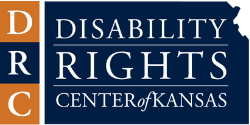Fact Sheet: Agreement Between Disability Groups & State of Kansas Protects Liberty and Taxpayers by Focusing on Less Expensive Community Services
For several decades, Blue Ribbon Commissions and Mental Health Task Forces created by the Kansas Legislature have documented a number of significant challenges faced by residents in private mental health institutions in Kansas, called Nursing Facilities for Mental Health (NFMHs). Recently the Disability Rights Center (DRC) of Kansas brought together and helped lead a coalition of several organizations in a collective effort to prevent Kansans with mental health issues from languishing in NFMHs. This coalition reached an important agreement with the State of Kansas to expand less expensive community-based services and provide more community residential options for individuals living in, or at risk of being admitted to, NFMHs. This pre-litigation settlement will not only help prevent taxpayers from paying costly litigation and attorney’s fees, it will also ensure taxpayers are funding more efficient, effective and less costly community-based services in the future.
This agreement will help protect the liberty rights of individuals in these institutions who want to live in the community and it will also lead to many of these individuals being able to live in a lower-cost setting in the community with the supports they need. Making it easier for individuals with mental health needs to safely transition to the community is far better for Kansas taxpayers and it helps prevent Kansas government programs from trampling on Kansan’s right to liberty and to live in the most integrated setting in the community. These are liberty rights granted to all Kansans with disabilities by the U.S. Supreme Court in its Olmstead decision. To do this, Kansas will increase specific mental health services and expand supports at the community level, creating the most effective path for NFMH residents to achieve community integration and liberty.
These necessary mental health services will allow many of the more than 600 NFMH residents in Kansas the opportunity to live in the most integrated setting possible. To ensure the efficacy of the expanded services, goals, practice improvements, and measurable outcomes are outlined as part of the agreement.
Kansas is the only state in the country to establish board and care nursing facilities exclusively for people with mental health disabilities, and more than 600 people live and often languish in the 10 NFMHs, which are entirely funded with State General Funds (SGF). This agreement will provide necessary mental health services to allow these individuals to avoid institutionalization and to live in the most integrated setting. Representatives from DRC, Topeka Independent Living Center, AARP Foundation, the Center for Public Representation, and Shook, Hardy and Bacon negotiated the agreement with the State.
Kansans will see total implementation of the agreement in an eight-year period, with most services being phased-in during the first six years.
What exactly is in the agreement? See the significant changes below:
- Specialized Services: The State will create specialized services that will include hands-on case management, community integration day services, vocational and employment support services, rehabilitative services, behavior support services, and therapy services.
- Informed Choice: All NFMH residents will receive comprehensive, accurate and understandable information to allow them to make an informed choice about their options if they wish to return to the community. The State will develop educational and training materials for the residents on informed choice as part of these efforts.
- Community Transition: The State will train Community Mental Health Center staff to provide NFMH residents relevant, understandable information addressing barriers to community transition. They must provide opportunities to visit community programs and offer necessary assistance to allow residents to participate in community activities while in an NFMH. These and other actions will help ensure that NFMH residents can make informed choices and take an active role in decision-making regarding the supports and services they need.
- Supported Housing: The State will expand supported housing services to 400 individuals in NFMHs and 300 individuals at risk of admission to an NFMH. This expansion is significant and will help combat homelessness among Kansans with mental illness and prevent unnecessarily keeping Kansans in these expensive NFMH institutions, which cost taxpayers far more dollars than community-based alternatives.
- Supported Employment: The State will expand supported employment services to 400 individuals in NFMHs and 350 individuals at risk of admission to an NFMH. With the right services and supports in place, current and former residents of NFMHs can work.
- Person-Centered Planning: Within 14 days of a new admission, the State will assign a trained case manager to develop a person-centered plan for the NFMH resident, including all necessary specialized services and transition services. The case manager will also develop a Wellness Recovery Action Plan (WRAP) that coordinates specialized services needed for individuals to transition to the community.
- Peer Support: The number of individuals providing peer support services, statewide, will increase by 10% in each of the next 5 years. Relationships are crucial to well-being, making peer support a vital element of recovery-oriented mental health treatment.
- Crisis Services: The State will develop and implement a plan to provide Assertive Community Treatment (ACT) teams and mobile crisis intervention and stabilization services statewide. This will increase the safety of Kansans experiencing mental health crises.
.png)






